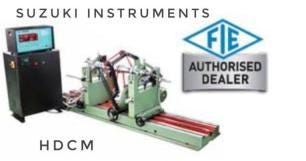Precision and Efficiency in Dynamic Balancing: Suzuki Instruments’ HDCM and HDM Models
Precision and Efficiency in Dynamic Balancing: Suzuki Instruments’ HDCM and HDM Models
In the world of industrial manufacturing, balancing rotating components is crucial to ensure smooth operation, reduce wear, and extend the lifespan of machinery. Suzuki Instruments offers two highly efficient dynamic balancing machines — the HDCM and HDM models — that deliver precision, reliability, and efficiency for a variety of applications.
Belt-Driven Horizontal Balancing Machines — Model: HDCM
Suzuki’s HDCM model is a belt-driven horizontal balancing machine, designed to provide exceptional precision when balancing parts like flywheels, pulleys, and other horizontally rotating components. The belt-driven mechanism plays a key role in ensuring controlled speed and accuracy throughout the balancing process. By accurately detecting and correcting imbalances in components, the HDCM reduces vibration, which not only improves the performance of the machinery but also helps in preventing premature wear, resulting in lower maintenance costs.
One of the standout features of the HDCM model is its ability to accommodate a wide range of parts, varying in size and weight. This flexibility makes it suitable for multiple industries, from automotive to aerospace, where different components need to be balanced to ensure optimal performance. Additionally, the robust construction of the machine, combined with the belt-driven technology, maintains high levels of precision throughout the entire balancing procedure, making it a reliable solution for large-scale manufacturing operations.

Horizontal Balancing Machines — Model: HDM
The HDM model by Suzuki Instruments is another exceptional option for balancing horizontally rotating components, particularly heavier parts such as crankshafts, rotors, and other heavy-duty industrial components. Balancing machines like the HDM are essential for preventing vibration that could negatively impact machinery, leading to inefficiencies, increased maintenance, and potential damage over time.
Engineered with advanced sensors and monitoring systems, the HDM model guarantees high levels of accuracy and reliability. These systems are designed to swiftly and efficiently detect imbalances in heavy components, making it a crucial tool for industries requiring precision and speed. The HDM model is built to handle large and heavy components without sacrificing performance, ensuring that even the most demanding applications can rely on it for effective balancing.

The Importance of Precision and Efficiency
Both the HDCM and HDM models emphasize precision, efficiency, and reliability in balancing operations. Imbalances in rotating parts can lead to excessive vibration, which can cause premature wear on machinery, reduce the efficiency of operations, and result in costly downtime. Suzuki Instruments dynamic balancing machines are engineered to detect and correct imbalances quickly and effectively, ensuring that machinery operates smoothly and with minimal disruptions.
By maintaining high precision throughout the balancing process, these machines help manufacturers achieve greater reliability, higher productivity, and reduced maintenance costs. Whether you are working with lighter components like flywheels or heavy-duty parts like crankshafts, Suzuki’s HDCM and HDM models provide the necessary tools for improving the performance and lifespan of machinery across various industries.
In summary, Suzuki Instruments’ HDCM and HDM models are valuable assets for any manufacturing environment. With their advanced features, precise balancing capabilities, and ability to handle a wide range of parts, these machines are designed to ensure smooth, vibration-free operation, resulting in greater efficiency and lower operational costs.
Comments
Post a Comment